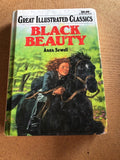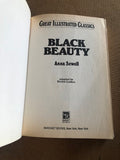Black Beauty by: Anna Sewell
Black Beauty is an 1877 novel by English author Anna Sewell. It was composed in the last years of her life, during which she remained in her house as an invalid.The novel became an immediate best-seller, with Sewell dying just five months after its publication, but having lived long enough to see her only novel become a success. With fifty million copies sold, Black Beauty is one of the best-selling books of all time. While forthrightly teaching animal welfare, it also teaches how to treat people with kindness, sympathy, and respect. In 2003, the novel was listed at number 58 on the BBC's survey The Big Read. PLOT: The story is narrated in the first person as an autobiographical memoir told by the titular horse named Black Beauty-beginning with his carefree days as a colt on an English farm with his mother, to his difficult life pulling cabs in London, to his happy retirement in the country. Along the way, he meets with many hardships and recounts many tales of cruelty and kindness. Each short chapter recounts an incident in Black Beauty's life containing a lesson or moral typically related to the kindness, sympathy, and understanding treatment of horses, with Sewell's detailed observations and extensive descriptions of horse behaviour lending the novel a good deal of verisimilitude. The book describes conditions among London horse-drawn taxicab drivers, including the financial hardship caused to them by high licence fees and low, legally fixed fares. A page footnote in some editions says that soon after the book was published, the difference between 6-day taxicab licences (not allowed to trade on Sundays) and 7-day taxicab licences (allowed to trade on Sundays) was abolished and the taxicab licence fee was much reduced. Anna Sewell (30 March 1820 - 25 April 1878) was an English novelist, best known as the author of the classic 1877 novel Black Beauty. Biography: Anna Sewell was born on 30 March 1820 in Great Yarmouth, Norfolk, England, into a devoutly Quaker family. Her father was Isaac Phillip Sewell (1793-1879), and her mother, Mary Wright Sewell (1798-1884) was a successful author of children's books. She had one sibling, a younger brother named Philip and was largely educated at home. When she was twelve, the family moved to Stoke Newington where she attended school for the first time.Two years later, however, she slipped while walking home from school and severely injured her ankles. Her father took a job in Brighton in 1836, in the hope that the climate there would help to cure her. Despite this, and most likely because of mistreatment of her injury, for the rest of her life she could not stand without a crutch or walk for any length of time. For greater mobility, she frequently used horse-drawn carriages, which contributed to her love of horses and concern for the humane treatment of animals.
Condition: Good




